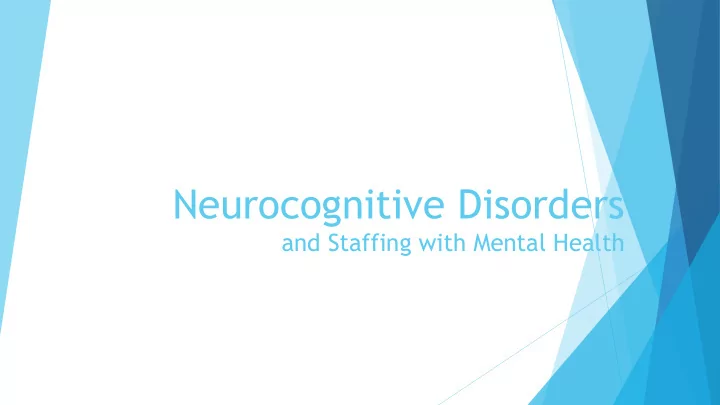

Neurocognitive Disorders and Staffing with Mental Health
Diagnoses and Documentation WHY? If you don’t write it down, it didn’t happen.
Neurocognitive Disorders (NCD) Primary clinical deficit is in cognitive function Represents a decline from a previously attained level of function Acquired vs. Developmental Mild vs. Major
Neurocognitive Diagnoses Delirium Neurocognitive Disorder Alzheimer’s Disease Frontotemporal Lewy Body Vascular Disease Traumatic Brain Injury Substance/Medication Induced HIV Infection Prion Disease Parkinson’s Disease Huntington’s Disease Due to Another Medical Condition Due to Multiple Etiologies Unspecified
Cognitive Domains Complex Attention: sustained attention, divided attention, selective attention, processing speed Executive Function: planning, decision making, working memory, responding to feedback/error correction, overriding habits/inhibition, mental flexibility Learning and Memory: immediate memory, recent memory (including free recall, cued recall, and recognition memory), very-long-term memory Language: expressive (naming, word finding, fluency, grammar), receptive language Perceptual-Motor Social Cognition
Major vs. Mild NCD Major Mild Evidence of significant cognitive decline from a previous Evidence of significant cognitive decline from a previous performance in one or more cognitive domains based on performance in one or more cognitive domains based on Concern of individual, knowledgeable informant, or Concern of individual, knowledgeable informant, or clinician clinician Substantial impairment in cognitive performance, Substantial impairment in cognitive performance, preferably documented by standardized preferably documented by standardized neuropsychological testing, or another quantified neuropsychological testing, or another quantified clinical assessment clinical assessment The cognitive deficits interfere with independence in The cognitive deficits do not interfere with capacity everyday activities (at a minimum requiring assistance for independence in everyday activities (complex with complex instrumental activities of daily living instrumental activities of daily living such as paying such as paying bills, managing medications) bills or managing medications are preserved, but greater effort, compensatory strategies or Cognitive deficits do not occur exclusively in the context accommodation may be required) of a delirium Cognitive deficits do not occur exclusively in the context Cognitive deficits are not better explained by another of a delirium mental disorder (e.g. major depressive disorder, schizophrenia Cognitive deficits are not better explained by another mental disorder (e.g. major depressive disorder, schizophrenia
Major vs. Mild NCD PER DSM 5: “The distinction between major and mild NCD is inherently arbitrary, and the disorders exist along a continuum. Precise thresholds are therefore difficult to determine.” This is why detailed and consistent documentation is essential to determining what supports an individual needs!
Key Information What is important to the individual? What is their history: social, work, medical? When did this issue become noticeable? Does the individual have a formal diagnosis? Are they aware of the diagnosis? How do they feel about it? What are their strengths? Are there any current supports in place to help them get through their day? What supports are they willing to accept?
Good Interview Questions Have client explain their medical issues and medications Ask them what they would do if they ran out of their medications Ask them how long they have lived in their home Have them explain their finances – how they budget, pay bills, balance their checkbook Have them describe a routine day – how they get their meals and take their medications If in the home, ask them to bring you a glass of water Ask judgement questions – What would you do if you smelled smoke? What would you do if you were having chest pain? What is the number to call in an emergency?
What Next? Is a neurocognitive disorder the primary diagnosis? Do they have a co-occurring mental health diagnosis? Primary of secondary? Do they need behavior supports? Do they need a referral for mental health treatment?
Mental Health Treatment For individuals with a co-occurring mental health diagnosis: Is the individual already engaged in services? Has the individual had past services? If so, what is the reason they are no longer engaged in treatment. Does the individual want to engage in services? Contact local mental health agency Contact PCP Contact local Older Adult Behavioral Health Specialist
Mental Health Treatment The individual can choose whether or not they wish to engage in treatment. The individual has to sign a Release of Information (ROI) for a clinician to be able to disclose treatment related information. The individual can also choose what information is/isn’t shared. Treatment services must be medically appropriate.
Mental Health Treatment Treatment means the planned, medically appropriate, individualized program of medical, psychological, and rehabilitative procedures, experiences and activities designed to remediate symptoms of a DSM diagnosis, that are included in the Service Plan. Examples Individual and group therapy Individual and group skills building Consultation Case management Psychiatric medication management
Mental Health Treatment Medically appropriate means the services and supports required to diagnose, stabilize, care for and treat a behavioral health condition. The Division shall make payment for medically appropriate behavioral health services when the services or supports are: Rendered by a provider whose training, credentials, or license is appropriate to treat the identified condition and deliver the service; Based on the standards of evidenced-based practice, and the services provided are appropriate and consistent with the diagnosis identified in the behavioral health assessment; Provided in accordance with an individualized service plan; Not provided solely for the convenience of the recipient, the recipient’s family, or the provider of the services
Consultation If you are calling to staff a case, please be prepared with the following information: Basic client demographics Diagnoses Guardianship status Preferred areas Natural supports Details regarding behaviors/symptoms of concern
Recommend
More recommend